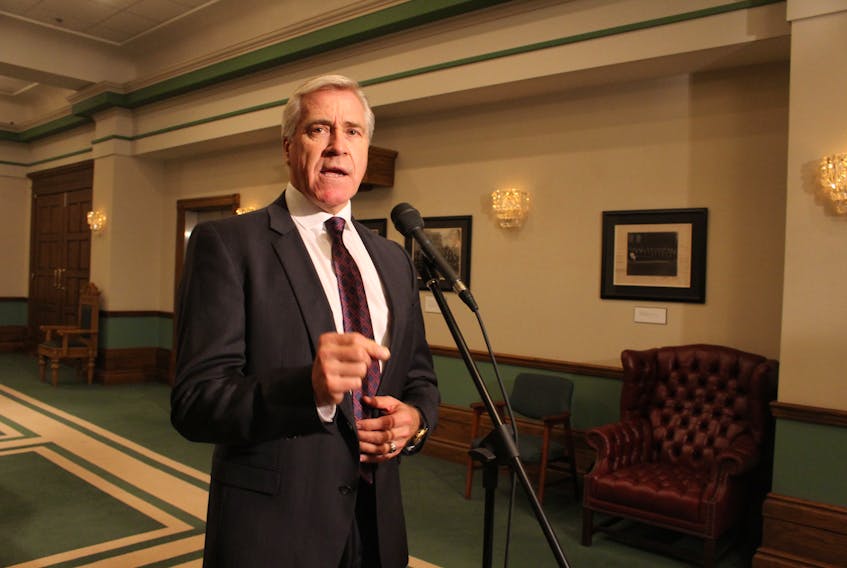Premier Dwight Ball said efforts are continuing on multiple levels — company, provincial government, federal government — to see a change in the estimated $30-million annual cost set to hit Corner Brook Pulp and Paper as a result of new U.S. tariffs.
Question period in the House of Assembly Thursday was dominated by the mill’s situation.
Ball was asked outside of the House if the province is prepared to provide some kind of direct relief.
“We’re not there yet,” he said.
Ball reiterated that the U.S. Commerce Department’s tariffs on uncoated groundwood paper — applying to newsprint — are still only preliminary. Final decisions are coming later this year.
“There’s a lot of ground to be covered before we get the final tariff (decision) in place, and then a decision will be made then on what Chapter 19 (a NAFTA challenge) looks like either federally, or industry-driven,” he said, adding the provincial government is working on the problem.
RELATED STORIES:
Corner Brook mill struck with estimated $30-M annual cost from American tariffs
Kruger says displaced works will move into casual pool at Corner Brook mill
In the House, NDP Leader Lorraine Michael called for a united front and a joint response. She asked if a strategy meeting could be arranged with representatives from all provincial political parties and Newfoundland and Labrador’s members of Parliament.
Outside the House, Michael said the situation is bigger than a provincial government.
“We understand that the province has very little power as a government, but you know we’re all in it together, we’re all wanting people to know that we’re concerned,” she said.
Michael suggested an all-party committee could be launched, but Progressive Conservative Leader Paul Davis said that is something that requires more time and looks at a long-term strategy.
“We need action right now,” he said, noting the preliminary decision by the U.S. imposes tariffs within days.
Davis said he would attend any all-party meeting called, but he also called for more to be done by Ball and federal Liberals.
“The prime minister stood (up) on steel and aluminum recently. We’ve seen him stand on Bombardier and standing for Quebec. Well, this needs to be a fast and sharp response from the federal government and the provincial government,” Davis said.
“I know the size of Bombardier and their operations is different from western Newfoundland, but proportionally and relatively speaking, this is significant to the western part of our province and the central part of our province, our forestry industry.”
Davis highlighted a response by the premier in the House to a question about communications with the Prime Minister’s Office. Ball made reference to a call last Friday, March 9, where newsprint was mentioned, and communications by government officials on Tuesday.
For his part, the premier said he would be willing to participate in meetings with the NDP and PCs about a response, but also that he will not allow the issue to become a political football — something he sees as inherent in the PC’s questions and comments.
As for the feds having the province’s back, Ball said the Government of Canada has been involved and continues to be involved.
He credited Foreign Affairs Minister Chrystia Freeland and Natural Resources Minister Jim Carr for being among the first to comment on the new tariffs. A statement out of Global Affairs Canada on Tuesday said they were both disappointed with the trade decision.
“Our government is committed to helping our forest industry enhance existing trade relationships and diversify trade with new international markets,” it reads.
“Canada’s forest industry sustains good, middle-class jobs and provides economic opportunities for rural and Indigenous communities across our country. We will continue to work with our forest industry, provinces and territories, and communities across Canada to defend this vital sector against unfair and unwarranted U.S. trade measures and practices.”
The premier acknowledged the prime minister has been in front of the cameras on steel and aluminum, but said these were cases with fears of industry-wide tariffs, as opposed to what is happening in newsprint, where different competitors within Canada are being hit with different charges on cross-border shipments.
The suggestion was that it complicates the response, offering the example of Quebec, where Resolute, White Birch and Kruger all have operations.
There are currently 424 anti-dumping and countervailing duty orders being enforced in the U.S., and the U.S. Department of Commerce has trumpeted the uptick in new orders, including the one affecting Kruger and Corner Brook Pulp and Paper.
“Enforcement of U.S. trade law is a prime focus of the Trump administration,” read a statement issued as U.S. Secretary of Commerce Wilbur Ross announced the anti-dumping decision.
“From January 20, 2017, through March 13, 2018, the Commerce Department has initiated 102 anti-dumping and countervailing duty investigations — a 96 per cent increase from the same period in 2016-17.”









